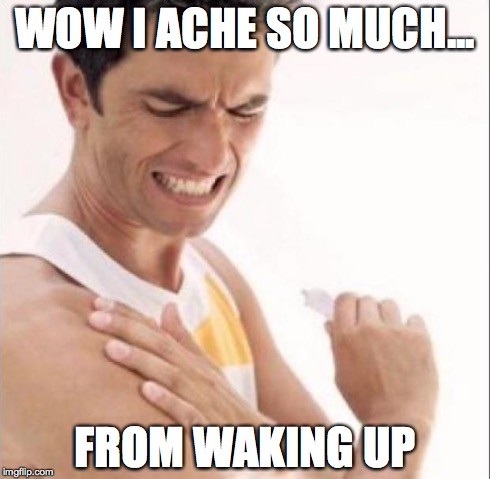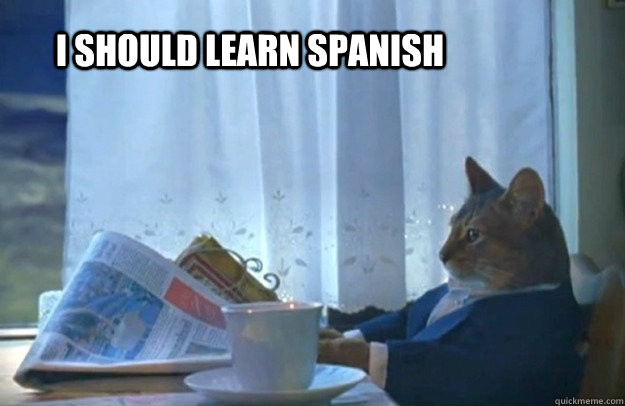My 5 favourite Spanish words
Despite my most recent article painting me as some Netflix-addicted hermit, I do in fact speak Spanish, improving it and learning new words every day.
In this little article I’ll be introducing you to some of my favourite words I’ve picked up. Through translating or day to day conversation, all these words have endeared themselves to me, be it their meaning or just the way they sound. They aren’t however in any particular order.
Empaparse
It’s pretty difficult for an abstract verb to be onomatopoeic, but something about this word makes it sounds exactly like its meaning, with the sound the two ps make help communicate the scale of the action. Literally to soak up, saturate, overwhelm something, you can use it to talk about the rain and other things. However, the context in which I think it’s best is when using it in a more figurative sense.

In this way, it’s perfect for Erasmus students, summing about the nature of the year abroad in one playful reflexive verb.
- Empaparse de la cultura - immerse yourself in the culture.
The soaking up part is even more extreme in this sense, conveying the idea of absorbing and taking in everything around you, that’s where the power of the ps come in.
Agujetas
Not only is this word perfect for practicing nearly every sound you’ll need to master if you want that flawless Spanish accent, but given its meaning, it has also entered my day to day vocabulary.

It means muscle stiffness, the kind you usually get after exercising. I first learnt this word after my attempts to go to the gym rendered me completely immobile for almost a week at work. I was constantly stretching and complaining but didn’t know how to describe what was wrong. One of my bosses told me the word and ever since (even though my stint at the gym has all but ended) I use it almost every day.
- No quiero ir al gimnasio porque tendría agujetas el día seguinte - I don't want to go to the gym as I'll be stiff tomorrow morning.
Despite being 21, I’m pretty sure I have the body of a 61 year old.

Witness the stiffness.
Augmentative -azo
Although this entry is not a word by itself, there is nothing more satisfying in Spanish than adding a big -azo at the end to drive home your point.
We have diminutives in English, but in terms of something making things bigger, we unfortunately don’t have the right tools for the job. You could argue that ‘f**k off +adjective’ is the closest thing we’ve got, but for obvious reasons it’s not that common…
The beauty of the Spanish version is that it isn’t NSFW and you can use it whenever, not just within your group of friends.
- ¡Qué golazo! - what a goal!
You will have most probably heard the example above before, but for me there is something even more exciting about a ‘cabezazo’. As you can probably guess, my translation would be ‘f**k off big head’ and in the footballing world would be used when someone scores a header of unimaginable proportions.
It’s the playful imagery that this simple augmentative conjures up that makes me love it. It turns something simple into something exciting and glorious. And, given my passion for football, makes it the perfect way to describe almost everything that happens in a game, whether I'm playing or simply watching. I turn in to a 4 year old when I play football (when it’s not competitive) and the fact there is a way I can communicate my excitement through words makes me feel all warm and fuzzy inside…

See what I did there?
Relámpago
My association with this word again stems from my love for football, however unlike the English equivalent isn't used in the same context. Nevertheless, this does not dissuade me from enjoying the phonetics of it.
The fact that you can say relámpago in a way that sounds like a thunderbolt is just amazing. The accent on the second syllable and the hard ‘p’ and ‘g’ towards the end give it three crescendos, similar to when a bolt of lighting cracks in the night. The ‘r’ at the beginning can be indefinite, you can hold it and roll it building tension and intensity quite literally like the calm before a storm.
It can also be used as an adjective, similar to the way we use it in English. You can be as fast as lighting, or do something at the speed of light. A way in which, along with the next word on my list, it has been used to describe myself during my time here (not that I’m bragging or anything).
- Es un relámpago haciendo tareas - he does his work at the speed of light.
The fact one word can whip up so many images of the very thing it describes is pretty cool. And although I do enjoy this word, I have included it mainly as an ambassador for all the words that fulfil the same purpose. The words that you can tell the meaning of, just from the way they sound.
I still wish they used it to describe a shot at goal too. Imagine Relámpagazo!

Tiquismiquis
Last, but certainly not least, is this beaut’.
Just by looking at the word you can tell it’s an absolute belter. And even if its looks aren’t enough to get you going, than have a listen at how provocatively the google translate women says it.
As I mentioned above, this word does not just look and sound great, but one that resonates on a personal level.
- Has sido estado cambiando el formato para tres horas ya. Tío, eres muy tiquismiquis - You've been changing the layout for three hours now. Mate, you're really fussy.
I’m not sure if I’m a perfectionist or just have OCD, maybe a combination of both. Nevertheless, whilst working on translations and formatting articles these afflictions have become all the more apparent. I can’t translate a word without knowing the exact desired meaning, causing me to research everything around it to make doubly sure I’ve done it right and even then I'm rarely ever happy with my choice. I also didn’t realise how much thought I was able to put in to what should be a heading or a subheading, a constant dilemma that brings out the worst of my tiquismiquis-ness.

"I'm fussy so you'll always disappoint me"
My boss called me this wondrous word after we were both fine-combing an article, and even though the connotations are more negative than positive, it’s a word I more than happily associate myself with. Any excuse to say it, right?
Learning a language can be fun
All in all, these are just 5 of many Spanish words and phrases that I love. Learning a language is full of benefits but finding these little gems is one of the best parts of it.

English is a loveable language, of course it is, puns especially are something I can’t get enough of. But for me, Spanish is more playful in terms of its individual words. The onomatopoeic nature of most of them as well as the general phonetics makes the language fun. Learning the damn thing is hard, but with words like this, it's enjoyable all the same.
So to finish off, here's a something with everything in.
Soy muy tiquismiquis en cuanto a mi salud. Suelo ir al gimnasio y me empapo de sudor porque soy un relámpago haciendo ejercicios y como resultado me salen unas agujetazas de kilo.

Have your own favourites?
Leave a comment below and share them with everyone else!
Photo gallery
Content available in other languages
- Deutsch: Meine 5 spanischen Lieblingswörter
- Français: Mes 5 mots espagnols préférés.
- Polski: 5 ulubionych hiszpańskich słów
- Türkçe: En sevdiğim 5 İspanyolca kelime
- Español: Mis 5 palabras favoritas en español
- Português: As minhas 5 palavras Castelhanas favoritas
- Italiano: Le mie 5 parole spagnole preferite
Want to have your own Erasmus blog?
If you are experiencing living abroad, you're an avid traveller or want to promote the city where you live... create your own blog and share your adventures!
I want to create my Erasmus blog! →











Comments (2 comments)
Mate, just to let you know, the phrase ''Has sido estado cambiando el formato para tres horas ya.'' sounds quite weird in spanish. You can say: Has estado cambiando el formato durante tres horas or Has ido cambiando el formato durante tres horas. Even you could say: Llevas cambiando el formato tres horas, but the option you choose sounds quite strange.
As a Spanish I liked your post. Keep writting ;)
Ok thanks mate! And to help with your English in return make sure you don't add to many letters. For 'choose' you need it to be 'chose' and 'writting' needs to be 'writing'.
But thanks for the heads up once again